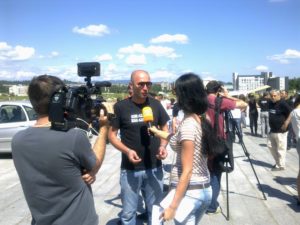 Author: Irma Kakhurashvili, Georgia
Author: Irma Kakhurashvili, Georgia
Thanks to the harm reduction and methadone programmes, the rate of HIV transmission among injecting drug users went down in 2011-2017. We decided to find out who facilitated implementation of those programmes, fighting for people’s lives.
Implementing harm reduction programmes, changing attitudes towards drug users and protecting their rights was possible, in particular, thanks to the incredible efforts and commitment of civil society organizations. Thus, the Georgian Harm Reduction Network was founded in 2006, bringing together 27 organizations. In 2008, the Network had 9 service delivery sites all over the country. Starting from July 2013, 14 service delivery sites have been operating in 11 Georgian cities. Such sites offer free services to people who use drugs: testing, clean syringes, counselling, legal support, case management, etc. In 2017, 30,000 people who use drugs received at least one service offered by the Georgian Harm Reduction Network.
“Considering current repressive drug policies, it is not easy to bring a person who injects drugs to a service delivery site. That is why in cooperation with the community of drug users and various NGOs we offer our services not only in our centres but also in the places convenient for drug users. Besides, the Georgian Harm Reduction Network has six mobile clinics, which deliver services in 65 cities of Georgia. They do testing not only among drug users but also among the general population,” tells Maka Gogia, Director of the Georgian Harm Reduction Network.
Hoping for the expertise of civil society organizations
Since 2013, with support of the Global Fund, the Network was able to mobilize the communities of drug users in response to the epidemics of hepatitis C and HIV. The first self-organizations – Hepa Plus and New Vector – became the champions in fighting for the rights of drug users. The community of drug users was the first to speak against the practice of compulsory drug testing, informing the drug users that they may refuse to undergo such testing run by law enforcement agencies. Apart from the fact that this procedure is rather humiliating, it also costs a lot of money to the country. According to 2015 data, GEL 15 million (about EUR 4.7 million) were spent for drug testing.
The Georgian Harm Reduction Network hopes that after the Global Fund leaves the country and cuts the funding of harm reduction programmes, the government will rely on the experience of civil society organizations. Taking into account the coverage and the positive impact of such programmes in terms of reducing the spread of risky behaviours and preventing new cases of HIV and hepatitis, international experts strongly recommend increasing the state funding allocated for such programmes to cover more people who need such services.
 Another problem that drug users in Georgia face – difficulties in receiving medical aid in case of overdose, despite the fact that overdose is one of the main causes of deaths among drug users. Regulation of the Ministry of Health, which was in force since 2000, did not allow ambulances to take patients with drug overdoses to inpatient hospital units before the arrival of patrol police. Besides, taking into account that in Georgia drug use is a criminal offence, drug users tried to hide any cases of overdose and even in critical circumstances refused to call an ambulance. According to the survey held by the Georgian Harm Reduction Network in 2013, 26.7% of drug users aged 30-35 years old had an experience of overdose, 42.1% were present when another person had an overdose and only 15.80% of them called an ambulance.
Another problem that drug users in Georgia face – difficulties in receiving medical aid in case of overdose, despite the fact that overdose is one of the main causes of deaths among drug users. Regulation of the Ministry of Health, which was in force since 2000, did not allow ambulances to take patients with drug overdoses to inpatient hospital units before the arrival of patrol police. Besides, taking into account that in Georgia drug use is a criminal offence, drug users tried to hide any cases of overdose and even in critical circumstances refused to call an ambulance. According to the survey held by the Georgian Harm Reduction Network in 2013, 26.7% of drug users aged 30-35 years old had an experience of overdose, 42.1% were present when another person had an overdose and only 15.80% of them called an ambulance.
A big success of civil society organizations and human rights activists was the ban on notification of police by healthcare workers in case of overdoses in 2014.
“We do not have the exact statistics, but changes in the laws reduced the number of deaths. However, it is only a minor improvement comparing to what the government should do to humanize the drug policy,” says Konstantin Labartkava, Chairman of the Network of People who Use Drugs in Georgia (GeNPUD).
One of the most effective response measures to overdoses is naloxone, but in Georgia, this medicine can only be bought in pharmacies by prescriptions. On numerous occasions, various NGOs requested the Ministry of Health to increase the accessibility of naloxone, but there still have been no changes in this regard.
Activism against the repressive system
Despite all changes, the Georgian drug policy remains inhumane. For example, a person who has four ecstasy pills may receive a stricter punishment than a person who commits a murder or a rape. Lack of reintegration programmes for ex-prisoners does not allow them to find a job, renew their social connections or receive an adequate psychosocial support.
 “My dependence is 16 years old. I have spent over three years in prison for drug use and almost died of the abstinence syndrome. My family fell apart. After I got out of jail, I have been looking for a job for a long time, but in vain. Nobody wanted to give me a job when they learned that I had a criminal record… Several times police took me for drug testing, right from the street and from my own yard, where I was having a walk with my small son… Four times, I received drug treatment, I did my best but as there is no psychosocial rehabilitation in Georgia, it all went wrong. If I had no support of my friends from the New Vector NGO, this drug policy would totally ruin my life. Now I am a social worker and I help other drug users to fight for their rights and their health. I think that the repressions which ruined so many lives should end!” says Giorgi M., former drug user, 38 years old.
“My dependence is 16 years old. I have spent over three years in prison for drug use and almost died of the abstinence syndrome. My family fell apart. After I got out of jail, I have been looking for a job for a long time, but in vain. Nobody wanted to give me a job when they learned that I had a criminal record… Several times police took me for drug testing, right from the street and from my own yard, where I was having a walk with my small son… Four times, I received drug treatment, I did my best but as there is no psychosocial rehabilitation in Georgia, it all went wrong. If I had no support of my friends from the New Vector NGO, this drug policy would totally ruin my life. Now I am a social worker and I help other drug users to fight for their rights and their health. I think that the repressions which ruined so many lives should end!” says Giorgi M., former drug user, 38 years old.
That is why activists and the community advocate for the decriminalization of the drug use. They are not ready to accept a compromise and call on the government to use more humane approaches to drug users and amend the existing legislation.
The court supported decriminalization
Two years ago, the central avenue of the Georgian capital – Tbilisi – became the epicentre of protest demonstrations. The protesters called on the authorities to change the repressive drug policies; new coalitions were founded; campaigns were initiated through mass media. The activism of civil society organizations, including self-organisations of drug users, gradually started bringing its result. The Prime Minister, Giorgi Kvirkashvili appealed to the Parliament calling for drug policy liberalization. On 16 June 2017, members of the Parliament supported the draft law developed by the Ministry of Justice, stating that 70 grams of dry cannabis and 140 grams of raw cannabis were considered as small amounts of the substance, the purchase and possession of which leads only to administrative responsibility.
In December 2017, the Constitutional Court of Georgia supported decriminalization of cannabis. It decided that bringing up criminal proceedings for the use of cannabis was against the Constitution and banned such practice. Georgian people said that this court decree was revolutionary.
 Striving to accelerate the progress in changing the laws and establish a humane drug policy, experts and civil society activists founded the National Drug Policy Platform. Over 40 participants of the Platform were involved in the development of a draft law, stipulating decriminalization of all types of drugs in adequate quantities and the development of harm reduction and psychosocial rehabilitation programmes. The draft law is based on the international expertise and is supported by such reputable organizations as UNAIDS, the Global Commission on Drug Policy and the International Drug Policy Consortium. The Portugal model was used as the best practice as it allowed reducing the number of people with drug dependence, significantly decrease the growth of new HIV cases and deaths caused by drug overdoses.
Striving to accelerate the progress in changing the laws and establish a humane drug policy, experts and civil society activists founded the National Drug Policy Platform. Over 40 participants of the Platform were involved in the development of a draft law, stipulating decriminalization of all types of drugs in adequate quantities and the development of harm reduction and psychosocial rehabilitation programmes. The draft law is based on the international expertise and is supported by such reputable organizations as UNAIDS, the Global Commission on Drug Policy and the International Drug Policy Consortium. The Portugal model was used as the best practice as it allowed reducing the number of people with drug dependence, significantly decrease the growth of new HIV cases and deaths caused by drug overdoses.
“None of the countries which made their laws more liberal observed the growth of drug use. Decriminalization surely does not mean encouragement of the drug use,” says David Otiashvili, Director of the Alternative Georgia NGO.
Alternative drug law
Recently, consideration of the draft law registered by the Platform in the Parliament in July 2017 was postponed for two months. The reason of such delay was the lack of consensus among the clergy, MPs and the Ministry of Internal Affairs.
It appeared that the Ministry of Justice developed an alternative draft law on the amounts of narcotic substances. This draft law defines the amounts of only six substances (amphetamine, desomorphine, MDMA, LSD, ephedrone, and methamphetamine) and reduces the small amounts of two substances (heroin and methadone).
According to the civil society activists, such amendments are fragmentary and do not resolve the existing problems. They say that the draft law developed by the Ministry of Justice ignores many injustices and systematic issues in the drug policy.



